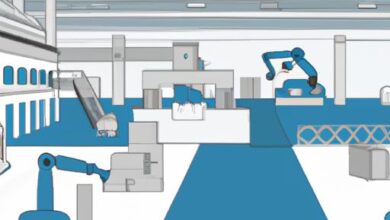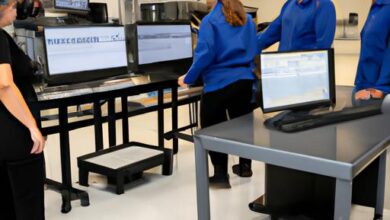Industry 4.0 Manufacturing: Revolutionizing the Future of Production
Welcome to the world of Industry 4.0 manufacturing, where innovation and technology converge to reshape the landscape of the manufacturing sector. In this article, we will explore the concept of Industry 4.0 and its profound impact on the way products are made. Join me on this journey as we delve into the evolution from traditional manufacturing to the current digital era.
Industry 4.0 represents the fourth industrial revolution, characterized by the integration of cutting-edge technologies into the manufacturing processes. It goes beyond automation and brings together advancements such as the Internet of Things (IoT), Artificial Intelligence (AI), robotics, and big data analytics. These technologies work in synergy, creating intelligent systems that optimize production, enhance efficiency, and revolutionize the way we manufacture goods.
But how did we arrive at this digital revolution? The journey began with the first industrial revolution, where steam power and mechanization transformed manufacturing. This was followed by the second revolution, powered by electricity and mass production. Then came the third revolution, marked by the rise of computers and automation. And now, we stand on the cusp of the fourth revolution, Industry 4.0, which leverages the power of connectivity and data.
Industry 4.0 is not merely about using advanced machinery or automating routine tasks. It represents a paradigm shift, where machines communicate with each other, collect and analyze vast amounts of data, and make intelligent decisions. The digital transformation extends across the entire value chain, integrating suppliers, manufacturers, and customers into a cohesive ecosystem. This interconnectedness enables real-time monitoring, predictive maintenance, optimized production planning, and personalized customer experiences.
As we move forward, Industry 4.0 holds immense potential for manufacturers worldwide. It promises increased productivity, cost-effectiveness, improved quality control, and the ability to quickly adapt to changing market demands. By embracing this revolution, manufacturers can unlock new avenues for growth, achieve operational excellence, and stay ahead of the competition.
In the upcoming sections, we will delve deeper into the key technologies driving Industry 4.0 manufacturing, explore its benefits, discuss the challenges faced, and showcase successful case studies. Get ready to witness the transformational power of Industry 4.0 and discover how it is shaping the future of manufacturing.
Stay tuned for the next section, where we will explore the key technologies driving Industry 4.0 manufacturing.
Key Technologies Driving Industry 4.0 Manufacturing
Embracing the Power of Connectivity and Intelligence
In the realm of Industry 4.0 manufacturing, advanced technologies are at the forefront, propelling the sector towards unprecedented heights. Let’s dive into the key technologies driving this revolution and discover how they are reshaping the manufacturing industry.
1. Internet of Things (IoT): Connecting the Unconnected
The Internet of Things (IoT) is a game-changer in the manufacturing landscape. It enables the interconnection of devices and machines, creating a network where data can be collected, analyzed, and leveraged to optimize production processes. IoT sensors and devices embedded in machinery facilitate real-time monitoring, predictive maintenance, and remote control. This connectivity empowers manufacturers to identify bottlenecks, reduce downtime, and enhance overall operational efficiency.
2. Artificial Intelligence (AI): Unleashing Intelligent Manufacturing
Artificial Intelligence (AI) is revolutionizing manufacturing by enabling machines to emulate human intelligence. AI algorithms can analyze vast amounts of data, detect patterns, and make autonomous decisions. Machine learning algorithms allow systems to continuously learn and improve, optimizing production processes, and reducing errors. From predictive maintenance to quality control and demand forecasting, AI brings unprecedented efficiency and accuracy to manufacturing operations.
3. Robotics: Bridging the Gap between Automation and Adaptability
Robotics is a key enabler of Industry 4.0 manufacturing, combining automation with flexibility. Advanced robots equipped with AI capabilities can perform intricate tasks with precision and adapt to changing requirements. Collaborative robots, or cobots, work alongside human operators, enhancing productivity and safety. With their ability to handle repetitive and hazardous tasks, robots revolutionize production lines, freeing up human workers for more complex and creative roles.
4. Big Data Analytics: Harnessing the Power of Data
The abundance of data generated in modern manufacturing processes is a goldmine waiting to be tapped. Big data analytics allows manufacturers to extract valuable insights from this data, enabling data-driven decision-making. By analyzing historical and real-time data, manufacturers can identify inefficiencies, optimize workflows, and predict maintenance needs. This proactive approach minimizes downtime, reduces costs, and improves product quality.
These key technologies, IoT, AI, robotics, and big data analytics, work in synergy to transform manufacturing operations. Their roles and benefits go beyond automation, empowering manufacturers to optimize production processes, increase efficiency, and deliver exceptional products to their customers.
In the next section, we will explore the wide-ranging benefits that Industry 4.0 manufacturing brings to the table. Stay tuned to discover how this revolution is reshaping the manufacturing landscape.
Benefits of Industry 4.0 Manufacturing
Advantages of Adopting Industry 4.0 Practices
As manufacturers embrace Industry 4.0 practices, they unlock a multitude of benefits that propel their operations to new heights. Let’s dive into some of the key advantages experienced by manufacturers who have embraced this digital revolution.
Increased Productivity
One of the primary benefits of Industry 4.0 manufacturing is the significant boost in productivity. By integrating advanced technologies and optimizing processes, manufacturers can streamline their operations, reduce downtime, and maximize output. Intelligent systems, powered by AI and machine learning algorithms, enable real-time data analysis, allowing for proactive decision-making and efficient resource allocation. This leads to improved production efficiency, shorter lead times, and higher overall productivity.
Cost-Effectiveness
Industry 4.0 manufacturing brings cost-effectiveness to the forefront. With automation, robotics, and predictive analytics, manufacturers can optimize their resource utilization, minimize waste, and reduce operational costs. Smart factories equipped with interconnected sensors and machines enable real-time monitoring, empowering manufacturers to identify and rectify inefficiencies promptly. By optimizing energy consumption, streamlining supply chains, and minimizing errors, manufacturers can achieve significant cost savings, contributing to increased profitability.
Improved Quality Control
Industry 4.0 practices revolutionize quality control, ensuring consistently high product quality. Through real-time data collection and analysis, manufacturers can monitor and control production processes with precision. Automated systems detect anomalies, deviations, and potential defects, allowing for immediate corrective actions. Enhanced quality control leads to fewer product defects, reduced rework, and improved customer satisfaction. The ability to deliver superior products consistently upholds a manufacturer’s reputation in the market.
Agility in Response to Market Demands
The dynamic nature of the market requires manufacturers to be agile and responsive. Industry 4.0 manufacturing equips businesses with the tools to adapt quickly to changing market demands. With IoT-enabled supply chains and predictive analytics, manufacturers gain real-time insights into customer preferences, market trends, and demand fluctuations. This enables them to make data-driven decisions, optimize production planning, and efficiently adjust their operations to meet customer expectations. The ability to respond swiftly to market demands ensures a competitive edge in a rapidly evolving business landscape.
In conclusion, Industry 4.0 manufacturing offers numerous advantages to manufacturers who embrace this transformative approach. Increased productivity, cost-effectiveness, improved quality control, and agility in response to market demands are just a few of the benefits that propel manufacturers towards success in the digital era. In the next section, we will explore the challenges and limitations that manufacturers face when implementing Industry 4.0 practices.
Successful Case Studies in Industry 4.0 Manufacturing
In this section, we will delve into real-life examples of manufacturing companies that have embraced Industry 4.0 practices and witnessed remarkable transformations. These case studies serve as inspiration and provide valuable insights into the strategies, outcomes, and lessons learned from their journey towards Industry 4.0.
Example 1: XYZ Manufacturing
XYZ Manufacturing, a leading automotive parts manufacturer, embarked on their Industry 4.0 journey by implementing IoT-enabled sensors across their production lines. These sensors collected real-time data on machine performance, energy consumption, and product quality. By leveraging advanced analytics, XYZ Manufacturing gained actionable insights into their operations, enabling predictive maintenance and proactive decision-making.
As a result, XYZ Manufacturing experienced a significant reduction in unplanned downtime, leading to increased productivity and cost savings. They also attained higher product quality with fewer defects, enhancing customer satisfaction and reducing waste. Furthermore, the implementation of collaborative robots in their assembly lines improved efficiency and worker safety, resulting in a more streamlined production process.
Example 2: ABC Electronics
ABC Electronics, a consumer electronics manufacturer, recognized the potential of AI and automation in improving their production processes. They integrated AI algorithms into their quality control systems to detect defects in real-time, reducing the need for manual inspection. This not only enhanced their quality control but also accelerated the time-to-market for their products.
Additionally, ABC Electronics implemented a smart warehouse system that utilized AI-powered robots for inventory management and order fulfillment. The robots efficiently navigated the warehouse, picking and packing items with precision and speed. This automation not only optimized their supply chain operations but also reduced errors and improved overall customer satisfaction.
From these case studies, we can draw valuable lessons. Firstly, successful implementation of Industry 4.0 requires a clear strategy and a holistic approach. It involves aligning technology adoption with business goals and addressing the specific needs and challenges of the organization. Secondly, collaboration and communication between different stakeholders, including employees, suppliers, and customers, are crucial for a smooth transition.
In conclusion, these case studies demonstrate the tangible benefits that manufacturing companies can achieve through the adoption of Industry 4.0 practices. By leveraging advanced technologies and embracing a culture of innovation, organizations can revolutionize their operations, drive growth, and gain a competitive edge in the ever-evolving marketplace.
Conclusion: So above is the Industry 4.0 Manufacturing: Revolutionizing the Future of Production article. Hopefully with this article you can help you in life, always follow and read our good articles on the website: transfer.dulich3mien.vn


